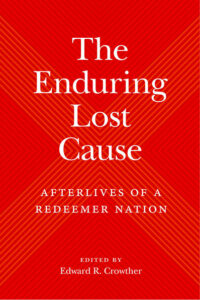Adams State University Emeritus Professor of History Edward R. Crowther, Ph.D., recently published The Enduring Lost Cause: Afterlives of a Redeemer Nation, with the University of Tennessee Press.
According to the press’s website, this book commemorates the fortieth anniversary of Charles Reagan Wilson’s classic Baptized in Blood: The Religion of the Lost Cause, 1865–1920, The Enduring Lost Cause collects essays by such scholars as Carolyn Reneé Dupont, Sandy Dwayne Martin, Keith Harper, and Wilson himself to show how various aspects of the Lost Cause ideology persist into the present. The Enduring Lost Cause examines the lasting legacy of a belief system that sought to vindicate the antebellum South and the Confederate fight to preserve it. Contributors treat such topics as symbolism, the perpetuation of the Lost Cause in education, and the effects of the Lost Cause on gender and religion, as well as examining ways the ideology has changed over time.

The book helps the reader understand the development of a cultural phenomenon that affected generations of southerners and northerners alike, arising out of the efforts of former Confederates to make sense of their defeat, even at the expense of often mythologizing it. Its tenets have become interwoven with a variety of cultural norms and expressions since the Civil War. Ultimately the narrative of the Lost Cause persists worldwide, merging with American exceptionalism to become a pillar of the conservative wing of US politics. Through ritual and memory, the Lost Cause persists as a cultural legacy both North and South. The Enduring Lost Cause provides a window into this world, helping us to understand the present in the context of the past.
Crowther is the author of Southern Evangelicals and the Coming of the Civil War and coeditor, with Keith Harper, of Between Fetters and Freedom: African American Baptists since Emancipation.
“It was a delightful experience to work with my colleagues on this book and to pay tribute to Charles Reagan Wilson, whose work continues to inspire our own,” said Crowther. “Just as antagonistic belief systems led to Civil War, the Lost Cause continues to shape cultural conflict today.”



